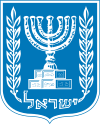Gush Emunim
| State of Israel |
|---|
 |
Gush Emunim (Hebrew: גוש אמונים, Bloc [of the] faithful) is an Israeli messianic and political movement committed to establishing Jewish settlements in the West Bank (Biblical Judea and Samaria).[1] While not formally established as an organization until 1974 in the wake of the Yom Kippur War, Gush Emunim sprang out of the conquests of the Six-Day War in 1967, encouraging Jewish settlement of the land based on the belief that, according to the Torah, God gave it to the Jewish people.[2] While Gush Emunim no longer exists officially, vestiges of its power remain in Israeli society.[3][4]
Political affiliations
Gush Emunim was closely associated with, and highly influential in, the National Religious Party (NRP). Nowadays they refer to themselves —and are referred to by the Israeli media as— Ne'emanei Eretz Yisrael נאמני ארץ ישראל (Hebrew: "Those who are loyal/faithful to the Land of Israel").
History
Gush Emunim was founded by students of Rabbi Tzvi Yehuda Kook in February 1974 in the living room of Haim Drukman[5][6], who is also credited with coining the term.[7] In addition to Drukman, its ideological and political core consisted of other disciples such as Hanan Porat, Moshe Levinger, Shlomo Aviner, Eleazar Waldman, Yoel Ben-Nun and Yaacov Ariel.[8] Kook remained its leader until his death in 1982.
In late 1974, an affiliated group named Garin Elon Moreh, led by Rabbi Menachem Felix and Benjamin (Beni) Katzover, attempted to establish a settlement on the ruins of the Sebastia train station dating from the Ottoman period. After seven attempts and six removals from the site by the Israel Defense Forces, an agreement was reached according to which the Israeli government allowed 25 families to settle in the Kadum army camp southwest of Nablus/Shechem. The Sebastia agreement was a turning point that opened up the southern West Bank to Jewish settlement. The small mobile home site housing 25 families eventually became the municipality of Kedumim, one of the major settlements in the West Bank. The Sebastia model was subsequently copied in Beit El, Shavei Shomron, and other settlements.
Ideology
Gush Emunim's beliefs were based heavily on the teachings of Rabbi Abraham Isaac Kook and his son, Rabbi Tzvi Yehuda Kook, who taught that secular Zionists, through their conquests of Eretz Israel, had unwittingly brought about the beginning of the Messianic age, which would culminate in the coming of the messiah, which Gush Emunim supporters believe can be hastened through Jewish settlement on land they believe God has allotted to the Jewish people as set forth in the Hebrew Bible.
In the wake of the mass eviction of Jews from Gaza by the Israeli government[1], the violent eviction of Jews from Amonah, and numerous other similar events on a smaller scale in more recent years, many members of the GE community have been having second thoughts about this ideology. For a fuller discussion of this recent issue, see Hardal.
See also
- Israeli settlements
- Jewish fundamentalism
- Moledet
- Orthodox Judaism
- Tzvi Yehuda Kook
- Gush Emunim Underground
- Moshe Levinger
- Menachem Froman
- Terror Neged Terror
Notes
- ^ Fundamentalism, Terrorism, and Democracy: The Case of the Gush Emunim Underground by Ehud Sprinzak, Hebrew University of Jerusalem. Last accessed: 9 August 2009.
- ^ Analyses of Gush Emunim have been carried out by David Newman. See: D. Newman, `Gush Emunim', Encyclopaedia Judaica Decennial Yearbook, 1994, pp. 171-172. Keter Publishers; D. Newman, `Gush Emunim: Between Fundamentalism and Pragmatism', Jerusalem Quarterly, 39, 33-43, 1986: D. Newman, `From “hitnachalut” to “hitnatkut”: The Impact of Gush Emunim and the Settlement Movement on Israeli Society’, Israel Studies, Vol 10 (3, 2005: See also T. Hermann & D Newman, `Extra Parliamentarism in Israel: A Comparative Study of Peace Now and Gush Emunim', Middle Eastern Studies, 28 (3), 509-530, 1992.
- ^ The Ideological Resonance of Zionist Fundamentalism in Israeli Society, Katherine Allen, Behavioral Sociology of Identity Conflict, Spring 2005
- ^ Encyclopaedia Judaica: Volume 8, p. 145
- ^ Ian Lustick, For the land and the Lord: Jewish fundamentalism in Israel, Council on Foreign Relations, 1988 p.63.
- ^ Gershom Gorenberg, The Accidental Empire: Israel and the Birth of the Settlements, 1967-1977, Times Books, Henry Holt & Co., 2006 p.356.
- ^ Gorenberg, The Accidental Empire, p.356.
- ^ Lustick, For the land and the Lord,' p.73.
